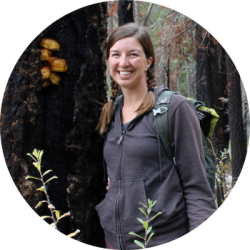-
Adriana Navarro Borrell
Dr. Morrell is a faculty member and researcher at Lethbridge Polytechnic with over 15 years of experience in Soil Science, Microbial Ecology, Mycology, and Plant Physiology. She’s also the founder and scientific lead of the Mycology Research Laboratory at Lethbridge Polytechnic. Originally from Cuba, she earned her BSc and MSc at the University of Havana, where she taught Plant Physiology from 2006 to 2009. In 2010, Dr. Morrell moved to Canada to pursue a PhD in soil science at the University of Saskatchewan, working in collaboration with Agriculture and Agri-Food Canada. She joined Lethbridge Polytechnic in 2015 as a full-time instructor in the Agriculture Science program and has been passionate about teaching and mentoring students ever since. She’s taught a variety of courses in the Agronomy Diploma and Bachelor of Agriculture Sciences programs and works closely with research assistants and senior project associates in the Mycology Lab. Her research focuses on improving soil health and ecosystem productivity through sustainable practices and better management of soil microbial communities. She has a strong interest in beneficial fungi, particularly arbuscular mycorrhizal fungi, and how they can be used as inoculants or encouraged naturally to support plant health. She’s also studied how these fungi help plants cope with environmental stresses, making them even more relevant in a changing climate. Dr. Morrell has shared her research widely, with numerous journal publications and over 50 conference presentations. Her work spans field, greenhouse, and lab studies, using biochemical and molecular techniques to explore plant-microbe interactions in Western Canada. She has also researched ways to optimize gourmet mushroom production by repurposing agricultural and food industry byproducts to boost sustainability and yields. Most recently, her work has turned toward grassland restoration in Alberta, looking at how soil microbial communities linked to native plant species can help bring these ecosystems back to life.
Websites: https://lethpolytech.ca/academic-centres/faculty-profiles/adriana-morrell https://lethpolytech.ca/departments/centre-for-applied-research-and-innovation/mycology

-
Monika Fischer
Monika Fisher is an Assistant professor at the University of British Columbia. She is a fungal biologist passionate about understanding the molecular mechanisms that mediate interactions and drive ecological processes. In particular her work is focused on understanding fire adaptation in fungi using Neurospora crassa as a model organism. She is also more broadly interested in how the fungi that emerge after fires shape ecosystems by looking at interactions between pyrophilous fungi and characterizing the soil microbiome post-fire.

-
Jon Stokes
Jon is an Assistant Professor in the Department of Biochemistry and Biomedical Sciences at McMaster University. His research focuses on the development and application of leading-edge machine learning techniques for novel drug discovery and design tasks, with an emphasis on antibacterial and neuro-oncology agents. Jon is also co-founder and CSO of Stoked Bio.

-
Vanessa Dumeaux
Vanessa Dumeaux is an Assistant Professor at Western University, where she develops computational and genomic tools to decipher molecular interactions in complex biological systems. Recognizing the vast diversity of cell types and states, her lab adopted single-cell transcriptomic profiling techniques and expanded their applications to microbial communities. Although her broader research interests encompass breast cancer, systemic immune responses, and host-adapted microbiomes, her talk will highlight her lab’s efforts to capture and interpret microbial phenotypic heterogeneity under drug treatment—with a specific focus on non-genetic survival strategies in Candida albicans.
Lab website: https://lab-dumeaux.science/

-
Joe Heitman
Joseph Heitman, MD, PhD is James B. Duke Professor and Chair, Department of
Molecular Genetics and Microbiology, Duke University and Co-Director and Fellow of the
CIFAR program Fungal Kingdom: Threats & Opportunities. His research studies model
and pathogenic fungi addressing fundamental questions of scientific and medical
importance. Pioneering studies with Baker’s yeast revealed how immunosuppressive
natural products interdict signaling cascades via FKBP12-drug complexes (in
collaboration with Mike Hall and Rao Movva), and discovered TOR as a globally
conserved nutrient sensor targeted by the immunosuppressive/antiproliferative drug
rapamycin. His research discovered unisexual reproduction of pathogenic microbes, with
implications for pathogen emergence, how sex generates diversity, and how sex evolved.
Dr. Heitman’s lab has further developed genetic/genomic approaches elucidating
molecular principles of fungal virulence, identifying therapeutic targets, and illustrating
convergent evolution of fungal mating-type loci with mammalian, insect, and plant sex
chromosomes. His studies have defined the calcium activated protein phosphatase
calcineurin as a globally conserved fungal virulence factor and are harnessing structural
biology to develop fungal specific inhibitors as novel therapeutic leads. They have
elucidated functions of RNAi in microbial pathogen genome integrity, RNAi loss in
hypervirulent outbreak lineages, and novel RNAi roles evoking drug resistance via
epimutations silencing genes. His research program has championed fungal genomics,
advanced the field, and mentored numerous students and fellows to impactful
independent careers in medicine and science.
Dr. Heitman was a Burroughs-Wellcome Scholar and HHMI investigator, received
the Gustavo Cudkowicz Prize, AMGEN award (ASBMB), Squibb award (IDSA), NIH
MERIT award (2011-2021), Korsmeyer Award (ASCI), the Rhoda Benham Award
(MMSA), the Edward Novitski Prize (GSA), the ASM Basic Science Award, and the
Distinguished Mycologist Award (MSA). He is an elected fellow or member of the
American Academy of Microbiology, the American Society for Clinical Investigation, the
Association of American Physicians, the American Association for the Advancement of
Science, the American Academy of Arts and Sciences, the National Academy of
Sciences, the German National Academy of Sciences – Leopoldina, and the National
Academy of Medicine. He is an editor for PLOS Genetics, mBio, PLOS Pathogens, and
Fungal Genetics & Biology, an editorial board member for PLOS Biology, Current
Biology, and Cell Host & Microbe, and has edited 7 textbooks. He received BS/MS
degrees from the University of Chicago, MD/PhD degrees from Cornell and Rockefeller
Universities, and was an EMBO long-term fellow at the Biocenter in Basel, Switzerland.
Selected publication list:
Heitman, J., Movva, N.R., and Hall, M.N. Targets for cell cycle arrest by the
immunosuppressant rapamycin in yeast. Science, 253: 905-909, 1991.
Odom*, A., Muir*, R.S., Lim*, E., Tofalletti, D., Perfect, J., and Heitman, J. Calcineurin is
required for virulence of Cryptococcus neoformans. EMBO Journal, 16: 2576-2589,
1997.
Lin, X., Hull, C.M., and Heitman, J. Sexual reproduction between partners of the same
mating-type in Cryptococcus neoformans. Nature, 434: 1017-1021, 2005.
Steinbach, W.J., Reedy, J.L., Cramer, R.A., Perfect, J.R., and Heitman, J. Harnessing
calcineurin as a novel anti-infective against invasive fungal infections. Nature
Reviews Microbiology, 5: 418-430, 2007.
Calo, S., Wall, C., Lee, S.C., Bastidas, R.J., Nicolás, F.E., Granek, J.A., Mieczkowski, P.,
Torres-Martinez, S., Ruiz-Vazquez, R.M., Cardenas, M.E., and Heitman, J.
Antifungal drug resistance evoked via RNAi-dependent epimutations. Nature, 513:
555-558, 2014.
Lab URL: https://mgm.duke.edu/heitman-lab
Google Scholar: https://scholar.google.com/citations?user=mfONplgAAAAJ&hl=en&oi=ao
Wikipedia: https://en.wikipedia.org/wiki/Joseph_Heitman

-
Adnane Sellam
Adnane Sellam is a Professor in the Department of Microbiology-Infectiology and Immunology, and a researcher at the Montreal Heart Institute. Dr. Sellam is an expert in the field of genomics and systems biology applied to the study of virulence of human pathogenic fungi. The aim of his research program is to gain a thorough understanding of the different aspects of the biology of opportunistic fungi, notably Candida albicans and the "super-resistant" yeast C. auris, in order to propose new therapeutic targets.

-
Sophien Kamoun
Sophien Kamoun is a biologist and professor at The Sainsbury Laboratory in Norwich, UK. Their group studies plant-pathogen coevolution and how it impacts mechanisms of virulence and immunity. Notably the Irish potato famine organism Phytophthora infestans and the rice and wheat blast fungus Magnaporthe (syn. Pyricularia) oryzae. They exploit state of the art findings on pathogen genomics and effector biology to develop novel disease resistant crops.

-
Isabelle Benoit-Gelber
Isabelle Benoit-Gelber is an associate professor at Concordia University. Her research group uses genomics and molecular biology approaches to characterize and understand metabolism in filamentous fungi. In particular, Aspergillus spp. which make a wide range of secondary metabolites, are a central focus in her research.

-
Matt Kasson
Matt Kasson is an Associate Professor of Forest Pathology and Mycology at West Virginia University. His current research areas include fungal-arthropod interactions, biological control of invasive plants and pathogens, and the biology and ecology of historic and emerging diseases of forest trees. Dr. Kasson is currently the interim director of the International Culture Collection of (Vesicular) Arbuscular Mycorrhizal Fungi (INVAM) and currently has research focused on the metabolites associated with interactions between arbuscular mycorrhizal fungi and their plant partners.


5th Annual CanFunNet Fungal Biology Conference
August 6 - 8 "From Local to Global"